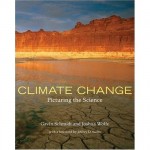I attended a book launch today for Climate Change: Picturing the Science, hosted by the Columbia Climate Center of the Earth Institute at Columbia University.
 The book is focused on how to take the science and communicate it through words and pictures. Leading climate scientists contributed to the writing of the chapters while the photographs were chosen based on what would explain and support the science.
The book is focused on how to take the science and communicate it through words and pictures. Leading climate scientists contributed to the writing of the chapters while the photographs were chosen based on what would explain and support the science.
The main authors, Gavin Schmidt and Joshua Wolfe, spoke on a panel with contributing authors Peter deMenocal and Stephanie Pfirman. Jeffrey Sachs gave a brief introduction (by video) and stressed the importance of having a worldwide understanding of the challenges that we face and that the defining component of any solution will be cooperation.
The moderator started with a few questions about the origins of the idea for the book, which was a photography show about climate change. Schmidt brought up the point that many of the books on climate change currently in stores are very political. This book, however, attempts to stay away from the politics and instead explain the science behind it all.
Peter deMenocal told an interesting anecdote about how when giving a talk at an auto show, he was asked what he thought about the list of scientists that don’t believe in climate change. He had answered, “My name is on that list.” But not by choice! Apparently, the people responsible for making the list put names of scientists on the list without their knowledge. deMenocal has tried to get his name off of the list, and is currently pursuing legal action through help from Columbia University.
Schmidt discussed the current dynamic where the scientists drive awareness of the issues, but the issues are dealt with and acted upon by the governments, policy makers, etc. Pfirman agreed that the interdisciplinary nature of the challenges would require more people working in an interdisciplinary community.
Wolfe notes that the level of the conversation must be brought to the next level. It isn’t just about changing light bulbs and taking public transportation, but more about strategies on a larger scale. Schmidt adds that the scale of the problem requires governmental action and global changes, such as in energy and farming. deMenocal says that “where this rests is with the younger generation” and that the career choices being made now are going to impact how they can make a living and make a difference.
The panel was followed by a lovely reception where I had some nice tabboulle and cheese. I have my signed copy next to me on my desk right now. Flipping through the book, I am wondering what kind of impact this book is going to make on the mentality and worldviews of the general public. The panel discussion was insightful for me especially because I am hoping to enter a related interdisciplinary career in the near future. Hopefully, my choices will lead me to doing something I love while making a difference.
he was asked what he thought about the list of scientists that don’t believe in climate change
Are there still conservatives who don’t believe in climate change at all? I thought that most of them had conceded that climate change exists, but now just argue that it’s not man-made.
I think there are still people who deny it. There probably will be for a while longer even. I think most conservative politicians have conceded that climate change is a reality, but that is because there is pressure for them to deal with the issues. It is definitely possible that there are a lot of people out there who still don’t think that the earth’s climate is changing.